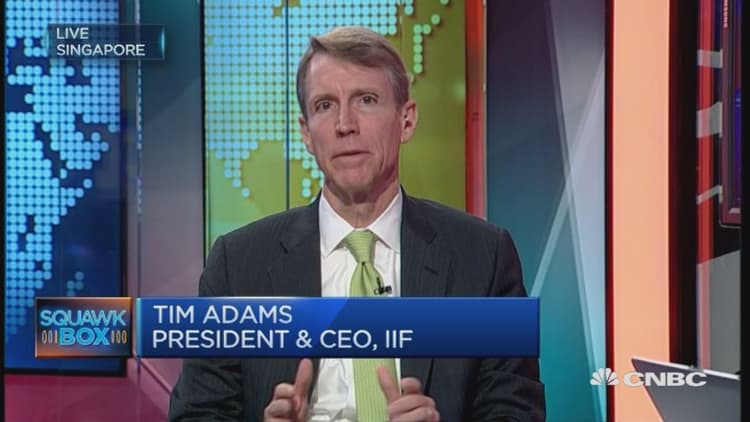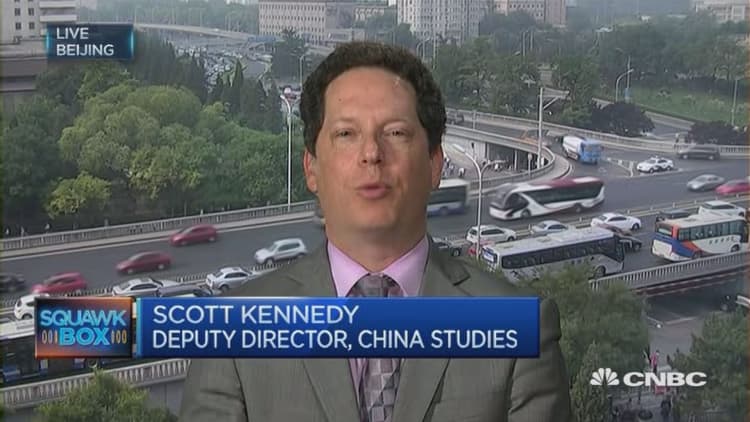


High-ranking government officials from the world's largest economies gathered in Beijing on Monday for the two-day U.S.-China Strategic and Economic Dialogue (S&ED), an annual meeting to address bilateral and regional issues. But this edition could take on a different tone from previous years.
The 2016 event will be the last under President Barack Obama, so analysts believe Washington will likely steer discussions towards areas with a higher success rate for signed agreements instead of politically sensitive subjects that are unlikely to produce any policy action.
"The S&ED is a place where the U.S. wants to go home with a long list of accomplishments to show American people what they've achieved," explained Scott Kennedy, director of the project on Chinese Business and Political Economy at The Center of Strategic and International Studies (CSIS).
"There's a tendency at these high-level events to come out with concrete deliverables, there's always political pressure on both sides," echoed Damien Ma, fellow and associate director at U.S. think tank The Paulson Institute.
In Monday's opening remarks, Chinese President Xi Jinping urged the need for both heavyweight economies to establish "fundamental, strategic, mutual trust," the South China Morning Post reported. "There is no reason to be scared of having differences, the key is not to adopt a confrontational attitude towards any differences," Xi was quoted as saying.
Currency volatility has traditionally been a headliner at the S&ED in previous years, with Washington long accusing Beijing of pushing the renminbi lower to increase trade competitiveness. This year, that may not be the case.
"The point of focus is shifting to real economic issues, primarily excess capacity in industrial goods like steel and aluminum. That will be more front and center than the currency issue," noted Ma, who pointed to the U.S. Treasury Department's foreign exchange market report as evidence.
Released in April, the report said none of the U.S.'s big trading partners had engaged in currency manipulation in the past year.
"The key for the last stages of the Obama administration is stability," said Tim Adams, president and CEO of The Institute of International Finance (IIF), a global financial industry body. "The exchange rate has become politicized as part of the U.S. election process so it's in both sides' interest to try and de-emphasize it, and instead deal with longer-term structural issues like excess capacity."
Indeed, oversupply in China's industrial sectors have sent commodity prices reeling and fanned worries over the financial health of domestic state-owned enterprises. The matter is of particular concern, especially as the share of China's economy gets larger in proportion to the global economy, which increases Beijing's influence on world market prices.
"The U.S. is looking for issues they can push on an open door and get some kind of agreement. They are not making progress on currency, even though they said they don't want to talk about it. Other big issues like the South China Sea are also difficult. The Chinese have already committed to tacking overcapacity so bringing it up is a smart strategy," Kennedy remarked.
To be fair, Washington has been increasingly harping on the problem in recent months. The global steel market has been hard hit from sliding prices on the back of Chinese production, and U.S. officials warned Beijing to take urgent action in April.
At the S&ED, the emphasis will be on the pace and scale of overcapacity, explained Ma. There's no real disagreement on the issue but it's more a matter of how it's done and identifying obstacles, he said.
The South China Sea may be one arena that could invite a more forceful response from Washington, judging by the fiery words exchanged over the weekend.
"We do not make trouble, but we have no fear of trouble. China will not bear the consequences, nor will it allow any infringement on its sovereignty and security interest, or stay indifferent to some countries creating chaos in the South China Sea," Chinese Admiral Sun Jianguo said at the Shangri-La Dialogue, a major Asian security summit, in Singapore on Sunday.
It remains to be seen whether U.S. representatives at the S&ED will take up the side of the Southeast Asian nations, which include the Philippines and Vietnam, who are angered at China's territorial expansion in the disputed region.
"It's not quite Ali-Frazier but the two [U.S. and China] are circling around the ring, poking each other with their gloves. We all hope the gloves don't come off," said Kennedy, referring to the legendary boxing match between recently deceased Muhammad Ali and Joe Frazier.

